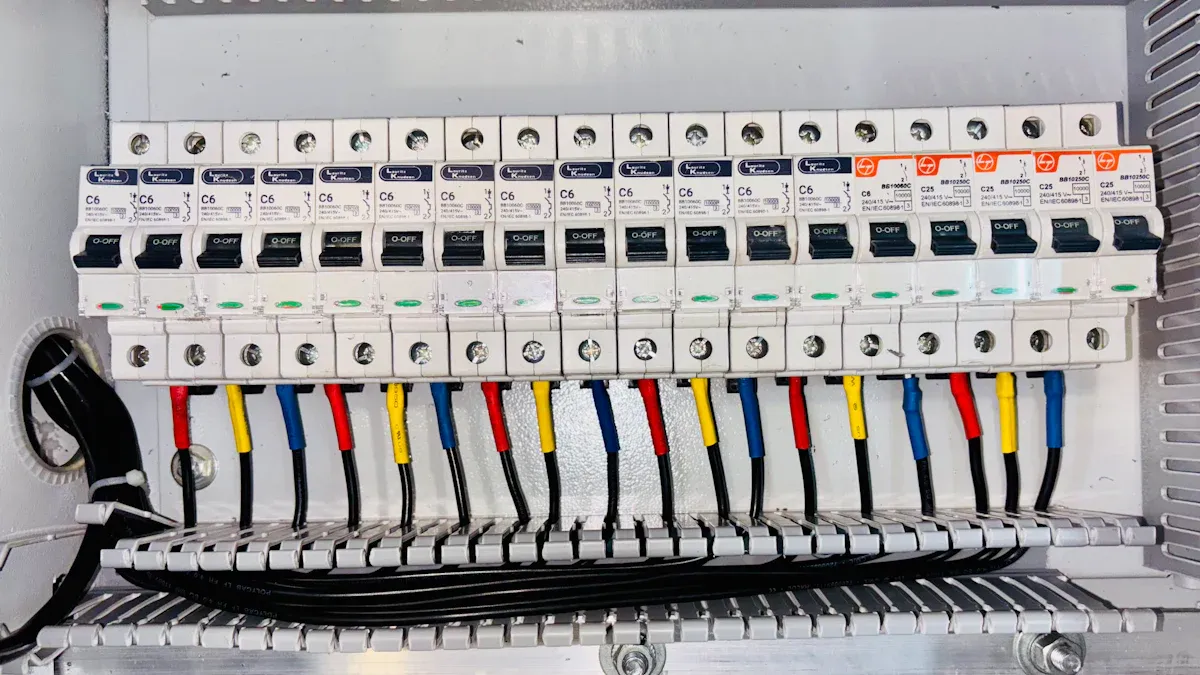
Reliable power distribution is the backbone of modern operations. From data centers to manufacturing plants, a dependable supply ensures uninterrupted workflows and prevents costly downtimes. Organizations increasingly demand intelligent solutions like remote-monitored PDUs to optimize power usage and boost productivity. In industrial settings, stable power from Three Phase PDUs avoids equipment failures and enhances efficiency. Choosing trustworthy PDU suppliers becomes essential for meeting these needs. By focusing on quality and innovation, businesses can ensure their systems run seamlessly and achieve long-term success.
Key Takeaways
- Look into suppliers carefully to make sure they match your needs.
- Read customer reviews to see if the supplier is trustworthy.
- Check for certifications to ensure safety and good performance.
- Review the types of PDUs offered to find the right one.
- Test reliability by checking references, support, and warranties.
Researching PDU Suppliers

Finding the right PDU suppliers begins with thorough research. This step ensures that businesses partner with suppliers who can meet their operational needs and provide long-term value. Below are three critical aspects to focus on during this process.
Assess Industry Experience and Reputation
A supplier’s experience and reputation often reflect their ability to deliver quality products and services. Companies with decades of expertise, like YOSUN, demonstrate a deep understanding of the PDU industry and its evolving demands. Their partnerships with major telecom providers highlight their reliability and market standing.
To evaluate a supplier’s reputation, consider measurable benchmarks such as customer support features, response time, and certifications. The table below outlines key factors to assess:
| Factor | Description |
|---|---|
| Customer Support Features | The level of assistance and training provided by the manufacturer. |
| Response Time | The speed at which the manufacturer addresses customer inquiries. |
| Certifications | Industry standards that the manufacturer meets, ensuring product quality. |
| Market Reputation | The overall perception of the manufacturer in the industry. |
| Customer Feedback | Reviews and ratings from users regarding product performance. |
| Sustainability | Commitment to environmentally friendly practices. |
By focusing on these criteria, businesses can identify suppliers who align with their values and operational goals.
Explore Customer Reviews and Testimonials
Customer reviews and testimonials provide valuable insights into a supplier’s performance. Positive feedback often highlights consistent product quality, timely delivery, and excellent customer service. For example, reviews for intelligent PDUs frequently emphasize their energy optimization capabilities and ease of integration into existing systems.
When analyzing reviews, look for patterns. Do customers praise the supplier’s responsiveness? Are there recurring mentions of innovative features or durability? These trends can help businesses gauge whether a supplier meets their expectations. Additionally, testimonials from well-known brands or industry leaders add credibility and reinforce trust in the supplier’s offerings.
Check for Certifications and Compliance Standards
Certifications and compliance standards validate a supplier’s commitment to quality and safety. Reliable PDU suppliers adhere to internationally recognized standards, ensuring their products meet industry requirements. Some key certifications to look for include:
- International Electrotechnical Commission (IEC): Sets guidelines for safety and performance, including standards like IEC 60364 and IEC 60950-1.
- Underwriters Laboratories (UL): Ensures products meet specific safety and environmental standards.
- Energy Star: Reflects energy efficiency and sustainability.
- ISO/IEC 27001: Focuses on information security management systems, crucial for connected devices.
These certifications not only guarantee product reliability but also demonstrate a supplier’s dedication to innovation and sustainability. Businesses should prioritize suppliers who consistently meet these benchmarks.
Evaluating PDU Product Offerings

Choosing the right PDU product is a critical step in ensuring efficient power distribution. Businesses must evaluate the available options carefully to find solutions that align with their operational needs. Below are three essential aspects to consider when assessing PDU offerings.
Review the Range of PDU Types Available
Understanding the different types of PDUs helps organizations select the most suitable option for their infrastructure. Each type offers unique features and performance metrics. The table below highlights the key differences:
| Type of PDU | Description | Performance Metrics |
|---|---|---|
| Basic PDU | Provides power distribution without monitoring capabilities. | Limited data on power usage. |
| Metered PDU | Offers basic monitoring of power usage at the outlet level. | Real-time power usage data available. |
| Monitored PDU | Provides detailed monitoring and alerts for power usage. | Historical trends and alerts for anomalies. |
| Smart PDU | Allows remote management and advanced monitoring features. | Comprehensive data analytics and control. |
For example, a data center requiring advanced monitoring and remote management may benefit from Smart PDUs, while smaller setups might find Basic PDUs sufficient. By understanding these distinctions, businesses can make informed decisions.
Ensure Compatibility with Your Requirements
Compatibility plays a vital role in the effectiveness of a PDU. Organizations should evaluate their specific needs to ensure seamless integration. Key factors to consider include:
- Power Source and Rating: Determine whether the equipment requires AC or DC input and verify the voltage rating.
- Number of Outlets: Ensure the PDU can support all current devices and allow room for future expansion.
- Outlet Types: Match the PDU’s outlet types with the plugs of connected devices to avoid using adapters.
- Additional Features: Decide if basic power distribution suffices or if advanced features like monitoring and remote access are necessary.
By addressing these factors, businesses can avoid compatibility issues and maximize the efficiency of their power distribution systems.
Compare Pricing and Value for Money
Price is an important consideration, but it should not overshadow value. Reliable PDU suppliers often provide a balance between cost and quality. Businesses should compare pricing across multiple suppliers while considering the features and benefits offered. For instance, a slightly higher investment in a Smart PDU may result in long-term savings through energy optimization and reduced downtime. Prioritizing value ensures that organizations receive durable, high-performing products that meet their needs.
Evaluating PDU product offerings with these criteria empowers businesses to make confident decisions. By selecting the right products, they can enhance operational efficiency and achieve long-term success.
Verifying Supplier Reliability
Reliable suppliers form the backbone of successful operations. Verifying their reliability ensures businesses receive high-quality products and dependable support. This step involves assessing references, testing customer service, and examining warranties to make informed decisions.
Request References and Case Studies
References and case studies provide a window into a supplier’s track record. Businesses can learn how suppliers have performed in real-world scenarios and gauge their ability to meet expectations. For instance, General Motors faced a crisis in 2014 due to a supplier’s failure to meet quality standards. Faulty ignition switches led to accidents and fatalities, underscoring the importance of supplier reliability.
When evaluating references, organizations should focus on industries similar to their own. Suppliers with experience in sectors like healthcare or telecommunications often demonstrate higher reliability due to stringent safety requirements. Case studies showcasing successful partnerships highlight a supplier’s ability to deliver consistent results.
Tip: Ask suppliers for case studies that detail their problem-solving approach and long-term support. This insight can help businesses predict how the supplier will handle challenges.
Test Customer Support and Responsiveness
Customer support reflects a supplier’s commitment to their clients. Testing responsiveness ensures businesses can rely on timely assistance during critical moments. Suppliers with robust support systems often provide faster resolutions, minimizing downtime and operational disruptions.
Approximately 70% of data center operators prioritize compliance with industry standards when choosing vendors. This preference highlights the link between reliability and certifications. Suppliers with CE marking or ISO/IEC 27001 certifications often excel in customer support, as these standards demand adherence to safety and security protocols.
Organizations can test support quality by contacting suppliers with inquiries or technical issues. Observing response times and the depth of assistance offered provides valuable insights into their reliability.
Examine Warranty and After-Sales Services
Warranties and after-sales services safeguard investments and ensure long-term satisfaction. Reliable suppliers offer comprehensive warranties that cover product defects and performance issues. These guarantees reflect their confidence in the quality of their offerings.
After-sales services, such as maintenance and technical support, enhance the value of a supplier’s products. Businesses should prioritize suppliers who provide ongoing assistance to address evolving needs. Companies with a strong portfolio of safety certifications often gain trust from clients, particularly in industries where reliability is critical.
Note: A supplier’s willingness to customize warranties or offer extended coverage demonstrates their dedication to customer satisfaction.
By verifying supplier reliability through references, customer support, and warranties, businesses can build partnerships that drive success. Trustworthy PDU suppliers empower organizations to achieve operational excellence and maintain peace of mind.
Finding a reliable PDU supplier involves three essential steps: researching their industry experience and certifications, evaluating their product offerings for compatibility and value, and verifying their reliability through references and support services. Each step builds a foundation for operational success.
Choosing a supplier that aligns with your needs ensures long-term efficiency and scalability. Reliable PDUs offer features like load balancing, remote monitoring, and energy efficiency, which reduce costs and enhance sustainability.
| Key Factor | Description |
|---|---|
| Power Capacity and Load Balancing | Ensures the PDU can manage equipment’s power demands without overloading. |
| Monitoring and Management Capabilities | Opt for PDUs with remote monitoring features to enhance operational efficiency. |
| Redundancy and Reliability | Look for PDUs with built-in redundancy to prevent power interruptions. |
| Scalability and Future-Proofing | Modular PDUs allow for easy upgrades as your data center grows. |
| Environmental Considerations | Energy-efficient PDUs help reduce operating costs and support sustainability goals. |
Tip: Begin your search today with confidence. A trusted supplier empowers your business to thrive and adapt to future challenges.
FAQ
What are PDUs, and why are they important?
Power Distribution Units (PDUs) distribute electrical power to multiple devices. They ensure stable power delivery, prevent overloads, and enhance operational efficiency. Businesses rely on PDUs to maintain uninterrupted workflows and protect critical equipment.
How can businesses identify reliable PDU suppliers?
Reliable suppliers often have strong industry experience, positive customer reviews, and recognized certifications. They offer high-quality products and dependable support. Businesses should evaluate these factors to ensure long-term partnerships.
What types of PDUs are available for different needs?
PDUs come in various types, including Basic, Metered, Monitored, and Smart PDUs. Each type caters to specific requirements, such as simple power distribution or advanced remote monitoring. Businesses should choose based on their operational goals.
Why is compatibility crucial when selecting a PDU?
Compatibility ensures seamless integration with existing systems. Factors like power source, outlet types, and device requirements must align with the PDU. This prevents inefficiencies and maximizes performance.
How do warranties and after-sales services benefit businesses?
Comprehensive warranties and robust after-sales services protect investments and ensure long-term satisfaction. Reliable suppliers provide ongoing support, helping businesses address evolving needs and maintain operational excellence.
Post time: May-16-2025





